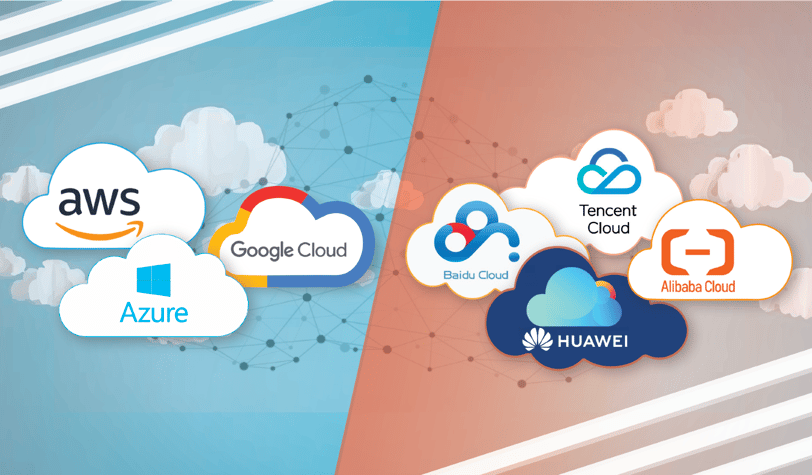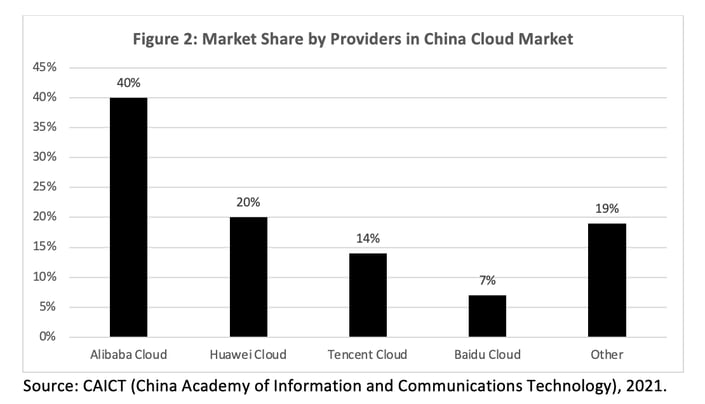Cloud in China: Who are the major players?
CLOUD
4/15/20225 min read


Cloud has been a hot topic as the COVID-19 pandemic has drastically accelerated adoption of cloud globally. Let’s first talk about what Cloud is and why it matters to us. Cloud is a service that allows businesses to rent access to cloud service providers’ data centers instead of owning and maintaining their own data centers. By using cloud, companies can avoid the upfront cost of building their own data centers and simply pay as they go and focus on their core business. Cloud powers much of the internet services we use daily, like our emails, our favorite apps, and our favorite websites. For example, Instagram has been running on Amazon’s cloud AWS since Instagram’s launch in 2010. Cloud is essential to the modern tech industry, like how essential water, gas and electricity are to our daily lives.
You may be familiar with US cloud market or cloud providers like AWS, Google Cloud, and Microsoft Azure, but not so familiar with the growing China cloud market and cloud providers. If you are an avid China-watcher, your business operates in China, you work in the cloud industry, or you simply care about cloud in general, then you should be interested in learning about China’s expanding cloud market. China’s cloud market has been growing at an astonishing rate, which has already caught attention of companies like Google and Microsoft. Microsoft Azure and AWS are both planning to expand their presence in China through partnerships with local Chinese companies.
So, what is current landscape of China’s cloud market and who are the major players?
What is current landscape of China’s cloud market?
According to market research company International Data Corporation (IDC), the public cloud market size in China was $19.38 Billion in 2020, which was only equivalent to 6% of global public cloud market ($312 Billion) or 10.8% of US public cloud market ($179 Billion). Even though China’s public cloud market is still very small compared to the global or US markets, it has been growing at an astonishing rate of over 60% year-over-year on average in the past 5 years (see Figure 1 below), which is significantly higher than that of 23.8% in the US (data from IDC). You can see from Figure 1 below that China’s public cloud market grew 85% from 2019 to 2020.


Who are the major players in China’s growing public cloud market?
Even though AWS and Azure dominate the US and global cloud services market, they are laggards in China, where China’s domestic cloud providers are dominating the market. The top 4 cloud providers account for over 80% of total China cloud market, with Alibaba Cloud being the strongest (40% of market share).


Who are the major players in China’s growing public cloud market?
Even though AWS and Azure dominate the US and global cloud services market, they are laggards in China, where China’s domestic cloud providers are dominating the market. The top 4 cloud providers account for over 80% of total China cloud market, with Alibaba Cloud being the strongest (40% of market share).
Alibaba Cloud
Alibaba was founded by Jack Ma in 1999. Alibaba market cap is ~$260B as of this writing. Annual revenue was $109B for FY2021 per Alibaba's 2021 annual report. Alibaba’s revenue comes from e-commerce (Taobao.com and Alibaba.com), fintech, clouding computing, digital media and entertainment, and other initiatives. Alibaba achieved a historic milestone of one billion annual active consumers globally in FY2021. Alibaba Group is also a majority owner of China's largest digital payment platform Ant Group, also known as Alipay. Alipay has around 640 million monthly active users (~2 times US population) as of December 2021, per Statista.
Alibaba Cloud, also known as Aliyun, was launched in 2009. Alibaba Cloud has 100+ products across computing, storage, database, and security, currently available in 24 regions and 74 availability zones. In FY2021, Alibaba cloud computing revenue grew 50% year-over-year from FY2020, even higher than AWS’s growth rate of 39% year-over-year. The strength of Alibaba Cloud is in the internet, financial services, and retail industries as Alibaba operates in these industries itself too.
Huawei Cloud
Huawei was founded by Ren Zhengfei in 1987. Unlike Alibaba, Huawei is a private company instead of a publicly listed company. Huawei’s market cap is estimated to be around $156B. Annual revenue of Huawei was $100B for FY2021. Huawei designs, develops, and sells telecommunications equipment, smartphones, and semiconductor chips. Huawei competes with Apple, Samsung, and other major smartphone makers in global smartphone market. Huawei's share of global smartphone market reached 20% in 2020 Q2, however, it dropped sharply to 8% due to strong performances from rivals and the effects of the US trade ban, per Statista. Huawei also competes with Qualcomm, MediaTek and other semiconductor companies in the Semiconductor industry. Huawei has become a big player in 5G chips.
Huawei Cloud was launched in 2005 as cloud is a strategic growth area for Huawei. Like Alibaba Cloud, Huawei Cloud is one of the world’s fastest growing major cloud service providers. It works with over 19,000 partners and 1.6 million developers, while over 4,000 applications have been launched on the Huawei Cloud Marketplace per Huawei’s 2021 annual report. Huawei Cloud’s strength is in ICT (Information and Communications Technology) infrastructure platforms. Huawei Cloud focuses on computing, storage and AI.
Tencent Cloud
Tencent was founded by Ma Huateng in 1998. Tencent market cap is ~$450B, even bigger than Alibaba, as of this writing. This makes Tencent the largest tech company by market cap in China. Annual revenue was $86B for FY2021 per Tencent’s FY2021 annual report. Tencent’s revenue comes from social media (WeChat and QQ), gaming, online advertising, Fintech (WeChat pay), streaming (Tencent video) and much more. WeChat had over 1.26 billion monthly active users (~4 times US population) in 2021 Q3 per Statista. WeChat pay competes with Alibaba's Alipay. WeChat pay has around 900 million users (~3 times US population) as of 2021.
Tencent Cloud, launched in 2005, is a subsidiary of Tencent Group. Tencent Cloud is available in 26 regions and 69 availability zones. Tencent Cloud is part of a rich digital ecosystem that includes some of China’s top social, messaging, mobile payment, gaming, digital literature, music streaming, and video platforms.
Baidu Cloud
Baidu was founded by Li Yanhong in 2000. Baidu is the “Google” of China as a search engine service company. Baidu market cap is ~45B as of now, much smaller than Alibaba, Huawei or Tencent. Annual revenue of Baidu was $19.5B for FY2021 per Baidu’s 2021 Annual report. Baidu’s revenue mainly comes from advertising from the search engine business and video streaming service iQIYI. Baidu heavily invests in self-driving technologies. Baidu’s apollo self-driving system is a leading self-driving platform.
Baidu Cloud was launched in 2012, much newer compared to Alibaba, Huawei and Tencent cloud. Baidu Cloud offers cloud storage services, client software, file management, resources sharing, and Third-Party Integration. The strength of Baidu Cloud is in AI capabilities as Baidu has been investing heavily in building its core AI technologies.
If you’d like to know more about cloud or tech in China in general, please like, share, or comment. I'll write more articles in this area if I see many of you are interested in this area.
